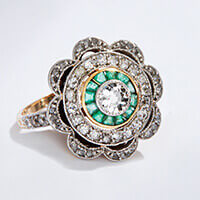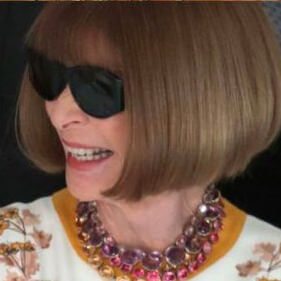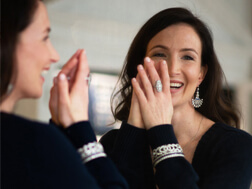-
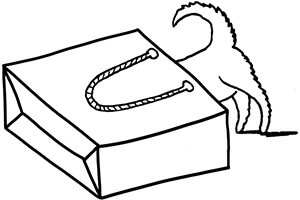
Your Shopping Bag is empty


Your Shopping Bag is empty

 Free Worldwide Delivery
Free Worldwide Delivery
In England and many Western cultures, the engagement ring is traditionally worn on the fourth finger of the left hand, also known as the ring finger. This tradition dates back to the Ancient Romans who believed that this finger contained the 'vena amoris' or 'vein of love', which was thought to be directly connected to the heart.
However, customs can vary greatly around the world, and in some cultures, the ring is worn on the right hand. Similarly, some people choose to wear the ring on a different finger due to personal comfort or professional requirements.
After the wedding, the engagement ring is often worn with the wedding band on the same finger. The wedding band is typically placed on the finger first, closer to the heart, followed by the engagement ring. Some people choose to have their engagement ring and wedding band soldered together to form a bridal set. This is largely a matter of personal preference and comfort.
As with all traditions, it's important to remember that personal choice and what the ring symbolizes – a commitment to a future together – is the most important thing.
This is the most frequently asked question and often considered a highly guarded trade secret.
As far as we're concerned, the answer is simple. We work with the best jewellery buyers in the UK to source exquisite engagement rings. These eagle-eyed experts are constantly on the hunt for the most high quality antique and vintage jewellery in the UK and beyond. It has taken many years to build and nurture these working relationships and fortunately we are now in the position to get first dibs on what we believe is the best supply of antique and vintage engagement rings in the UK.
Yes, of course they can! The vast majority of our engagement rings can be re-sized up or down, at no additional cost.
You have one free sizing per ring purchase - by one of the best jewellers in the trade - and it is valid for up to one year. Thereafter, ring sizings are charged at £90.00 (£75.00 + VAT) each.
Please note that a small minority of rings with particularly intricate shanks or stones running the whole way around cannot be re-sized as any alterations would affect their design integrity. We will clearly state if a ring cannot be sized on its product page.
The million dollar question! To get you started, if you don't know the lucky recipient's ring size, you can print off our Ring Measurer Thingy, find one of their rings at home and measure it against our template.
Sometimes it's just too hard to find out your partner's size without being caught. In these circumstances we recommend saving your free sizing until after you've proposed or the recipient has received their ring. Just send your ring back to us via secure post or book an appointment at our London showroom and we will measure your partner's finger, get it sized within three working days and return it to you. Incidentally, it's lovely for our team to meet the partner in person and congratulate the happy couple on their engagement.
We offer a 'no quibble', 30 day full money back guarantee on all engagement ring purchases. Items must be returned in the same condition we sent them in.
Alternatively you have 60 days to exchange/part-exchange an item.
Returns are free in the UK and for international orders the buyer pays return postage and any customs duties and sales taxes that may be incurred.
Please note the cost of any re-sizings (£72.00) will be deducted from the refunded amount.
All engagement rings bought through our website are delivered worldwide, free of charge (excluding any customs duties and local taxes). All deliveries are fully insured with end-to-end tracking.
UK - sent with DHL Express
International - sent with DHL Express Worldwide
Please note an adult signature is required to receive all packages.
UK - by the end of the next working day *
International - by the end of the next possible working day *
* These are estimates only and can vary. Based on orders placed before 2pm.
Please note ring sizing adds 2-3 days to delivery times.
Your engagement ring will arrive in one of our complimentary, signature blue AJC boxes. Our boxes are wrapped in tissue and accompanied by a handwritten note confirming the ring's authenticity.
We also offer luxury, handmade boxes, which you can add at checkout.
Packages arrive unbranded as we know many people want their gifts to be a surprise. If you are outside the UK we are required by your country to include a customs declaration on the packaging (for items over 100 years old), so we can't keep those as hush-hush.
Yes, we do. Our instalment plan requires a non-refundable deposit of 20% and the balance must be paid in full over a three-month period.
Yes! We’re pleased to offer our customers in the UK the chance to spread the cost of their purchase with up to 12 months Interest Free Finance for loans of up to £5,000. If you would like to pay using Interest Free Finance, please contact us and let us know what arrangement would work for you.
For orders over £5,000, the difference can be applied as a deposit, made payable to The AJC.
We offer a six-month warranty against damage that is not due to wear and tear and/or negligence subsequent to purchase. We specialise in the sale of antique and vintage jewellery, which due to many different factors may require special care. We therefore stress the importance of choosing an engagement ring that is appropriate for the wearer's lifestyle.
Please be aware that certain materials and styles are not suitable for everyday wear. If you have any questions or experience any problems with your purchase please contact us to discuss them. Depending on the nature of the issue, we will either repair the item for you free of charge or provide you with a repair quote from our trusted jeweller.
Within the first six months we will replace side or accent stones that go missing if we feel that the stones or settings were in some way defective. After six months any missing side or accent stones will be considered wear and tear and will be replaced at the expense of the customer.
Please note that you will be responsible for any delivery costs related to the repair. Any repairs or work not done by the AJC will void our warranty.
It's important to protect yourself against your engagement ring being lost, damaged or stolen. We recommend contacting your existing household insurers – many will already insure for up to £3,000 worth of jewellery worn at any one time, anywhere in the world. Ask them exactly what they would need in order to insure against the ring and how they assess the value of replacing an antique ring.
We advise that the best solution for protecting antique or vintage engagement rings is to cover the cost of finding an ‘equivalent’ ring rather than providing a modern reproduction, which lacks the original appeal of an old ring. We provide all our clients with a proof of purchase so that your insurers know what you spent on your engagement ring.
The 4Cs refer to the four main characteristics used to evaluate the quality and value of a diamond. They stand for Carat, Cut, Colour and Clarity.
Carat
This is the measure of a diamond's weight, and by extension, its size. Five carats equal one gram. Each 100 for the carat is expressed as a point. Generally, the larger the diamond, the more valuable it is, but size is not the only determinant of value.
Cut
This refers to how well the diamond has been cut from its raw form. Factors like the depth and symmetry of the cut, as well as the diamond's overall proportions and ability to reflect light (brilliance), are evaluated. The quality of the cut greatly impacts the diamond's sparkle and aesthetic appeal.
Colour
This measures the degree to which a diamond is colourless. The Gemological Institute of America (GIA) grades diamond colour on a scale of D (colourless) to Z (light yellow or brown). Colourless diamonds are rare and therefore more valuable.
Clarity
This assesses the presence of internal or external flaws, known as inclusions and blemishes, respectively. The GIA's clarity scale includes eleven grades ranging from Flawless (no inclusions or blemishes visible under 10x magnification) to Included (inclusions and/or blemishes visible to the naked eye). The fewer inclusions or blemishes, the higher the diamond's clarity and value.
Remember that the perfect combination of these 4Cs would ideally lead to the most valuable diamond. However, preferences can vary greatly from person to person. Some might prioritise size over perfect clarity, while others may prefer a flawless smaller diamond. Therefore, the best diamond is one that matches your personal taste and budget.
With antique jewellery you wouldn't want to remove and re-set the diamonds just to weigh them, as this risks damaging the settings. We estimate the carat weight by assessing the size, shape and cut of each stone using a digital calliper. The calculations used are based on modern cut styles with standardised proportions, so the weight of an antique cut diamond is more difficult to estimate. Our stated diamond carat weights should be used as a guide and not considered a guarantee.
Many engagement rings are hallmarked to indicate the purity of the gold, known as its 'fineness'. Where this stamp is present, we highlight the fineness (typically 22ct, 18ct, 15ct, 14ct or 9ct) in the details provided. Where it is not, we use chemical testing to determine the carat of the gold on the surface of the shank. Our stated gold carats should be used as a guide and not be considered a guarantee.
Absolutely, men can and do wear engagement rings. Although it's more common in Western cultures for only women to wear engagement rings, this is changing, and it's not unusual for men to wear them as well. This can depend on personal preference, cultural practices or a desire for both partners to have a symbol of their mutual commitment.
In some cultures and countries, it's traditional for both men and women to wear engagement rings. For instance, in Sweden, both members of the couple exchange simple bands upon their engagement.
Furthermore, some same-sex couples choose to have both partners wear engagement rings. And even in heterosexual relationships, some men choose to wear an engagement ring as a symbol of their upcoming marriage.
The design of men's engagement rings can vary greatly, from simple bands to rings with diamonds or other gemstones. The choice of style, like the decision to wear a ring itself, is largely a matter of personal preference.
It's important to remember that the purpose of an engagement ring is to symbolize love and commitment. As such, the decision to wear one, regardless of gender, is a personal one and should reflect the tastes and values of the individual.
Any more questions? Contact Us

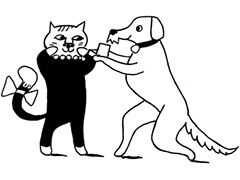 View All
View All
 Diamond
Diamond
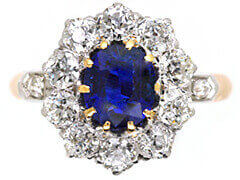 Sapphire
Sapphire
 Emerald
Emerald
 Ruby
Ruby
